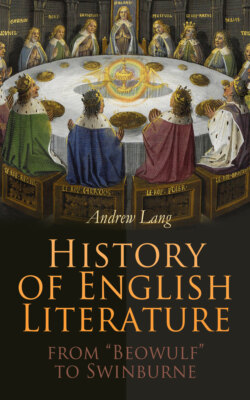Читать книгу History of English Literature from "Beowulf" to Swinburne - Andrew Lang, Robert Kirk - Страница 15
На сайте Литреса книга снята с продажи.
Cædmon.
ОглавлениеThe first sacred poet of whom we hear is Cædmon. His tale is told by the great and learned Bede, born at Wearmouth in Northumberland in 673, and trained in the new monastery there. Says Bede: "There was in the monastery of St. Hilda at Whitby, a Brother who, when he heard the Scriptures interpreted, could instantly turn the lesson into sweet verses." Just so the minstrel of Hrothgar, when he heard the nobles talk about Beowulf's defeat of Grendel, turned the story at once into a song. This was "improvisation," and Cædmon "improvised" religious poems; no man has equalled them since, says Bede. But he began when he was far from young, and was not yet a priest. Till then he had not been a poet; indeed, if he were at a feast where every man sang in his turn, when the harp was brought to people near him at table, he arose and went home.
One night he ran away from the harp into the stalls of the cattle, and there fell asleep on the straw. In a dream One appeared to him, and bade him sing. He answered that he had left the feast because he could not sing.
"You must sing."
"About what am I to sing?"
"The beginning of things created."
Cædmon then made in his sleep a poem about the Creation, and when he awoke he remembered it, as Coleridge made "Kubla Khan" in a dream, and remembered part of it until he was disturbed by a person on business from Porlock. After this Cædmon made sacred poems, doing Scripture into verse, with perfect ease, and he became a monk.
Now there exist long Anglo-Saxon poems on parts of Genesis, Exodus, and Daniel, and it has been very naturally supposed that these are the poems of Cædmon, which, as Bede thought, had never been equalled in the Anglian tongue. Nothing is known for certain, and only one short hymn has a good chance to be by the poet Cædmon. The ideas of the poet singing of the war in Heaven, so closely resemble those of Milton, in "Paradise Lost," that Milton has been supposed to have known something of the Anglo-Saxon poem.1 No lines in "Paradise Lost," are more familiar than those which describe a land of fire,
Yet from these flames,
No light, but rather darkness visible,
Served only to discover sights of woe.
The old Anglo-Saxon poet says:—
They sought another land,
That was devoid of light,
And was full of flame.
The speech of Satan, too, in Anglo-Saxon, the speech in which he blames the justice of God; his threat of what he would do, were he free for but one winter; his design to avenge himself on Adam and his posterity, are all like Milton, whose
Fairest of her daughters, Eve,
is exactly like
The fairest of women,
That have come into the world.
In the fighting scenes of these Anglo-Saxon Biblical poems, the poets appear to enjoy themselves most and to feel most at home. They have only to write in the manner of their own old battle songs, about the howling of wolves and crying of ravens to whom the victor gives their meat.
Indeed Anglo-Saxon poetry reminds us of an ancient casket of whalebone in the British Museum, with its scenes from the heathen story of Weland or Weyland Smith, the adoration of the Magi, Romulus and Remus and the wolf, and a battle between Titus and the Jews: such is the mixture of Christianity, heathenism, and learning in the Christian Anglo-Saxon literature.2
Thus in the long fragment "Judith," based on the well-known story of Judith and Holofernes in the Apocrypha, there is vigour in the descriptions of the intoxicated roaring Holofernes; and of the cries of wolf, raven, and eagle; and of the clash of swords and shields.
